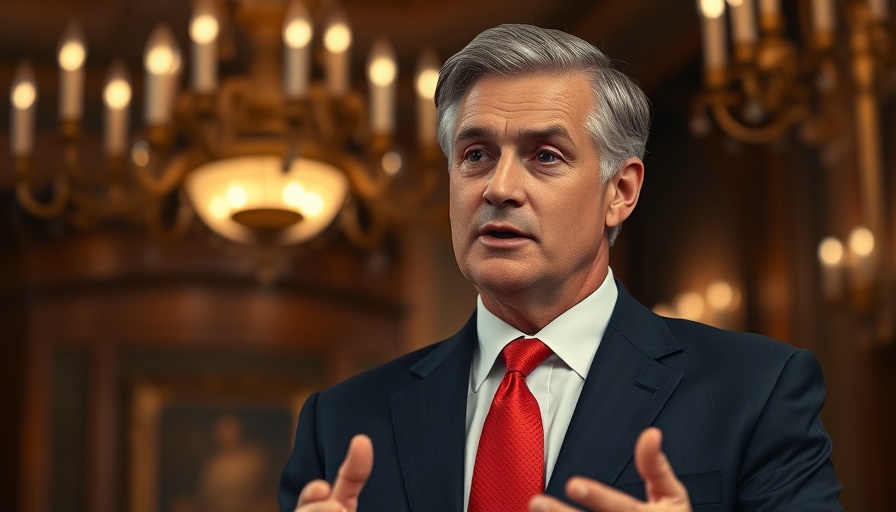
U.S. May Walk Away from Peace Talks: Implications for Ukraine
Recent statements from U.S. Secretary of State Marco Rubio have sparked alarm regarding the future of peace efforts between Russia and Ukraine. In a press conference following meetings with European and Ukrainian leaders, Rubio indicated that the U.S. administration, led by President Trump, is prepared to abandon its push for a peace deal if no progress is observed within a matter of days. This statement raises crucial questions about the stability of the region and the potential consequences for Ukraine in its ongoing conflict with Russia.
Understanding the Stakes: Why Swift Action is Crucial
Rubio's comments highlight a growing impatience within the U.S. government regarding Russia's inability to engage meaningfully in negotiations. After months of diplomatic efforts, both U.S. and European leaders are facing significant pressure to produce tangible results, as the prolonged conflict continues to take a toll on the lives of countless Ukrainians. Historically, peace negotiations in such entrenched conflicts have often stalled due to uncompromising positions. Without significant movement from the Russian side, the U.S. may soon pivot from its role as mediator in favor of exploring other avenues.
Political Landscape: A Growing Frustration
The U.S. perspective comes amidst a backdrop of mixed signals from the Kremlin. Although Russian officials, including spokesperson Dmitry Peskov, have mentioned some progress, they also underscore the challenges of engaging with Washington. This duality in diplomatic relations creates an environment of uncertainty. Moreover, the statement from Rubio comes at a time when both American and European leaders are witnessing growing public concern regarding the implications of the ongoing war and its humanitarian fallout.
What Happens Next? The Uncertain Path Ahead
As the U.S. administration evaluates its options regarding peace efforts, questions arise about the implications this decision will have on Ukraine and its allies. If the U.S. were to withdraw from the peace process, it could leave Ukraine in a precarious position, potentially leading to a bolstered Russian stance and prolonged hostilities. Observers fear such a departure could embolden Russia, undermining Ukraine's negotiating power and jeopardizing the lives of civilians caught in the crossfire.
Historical Context: Lessons from Past Conflicts
US foreign policy in conflict zones has often fluctuated, influenced by domestic political pressures and international dynamics. Historical instances, such as the U.S.'s engagements in the Middle East, serve as reminders of the complexities involved. The evolution of U.S. positions, from active involvement to strategic withdrawal, can inform current discussions regarding Ukraine and potentially shape the course of its war.
Future Predictions: Assessing the Landscape for Ukraine
As the situation evolves, predicting the trajectory of the peace talks requires an understanding of multiple facets. Analysts suggest that the continuity of pressure from Western allies will be critical in maintaining Ukraine's position. If the U.S. insists on an ultimatum-like approach, it risks creating an environment where diplomacy becomes further jeopardized, leaving millions without a resolution.
Diverse Perspectives: The Role of Global Powers
Despite the looming threat of U.S. withdrawal, many international players, including European nations, are closely monitoring the situation. Various countries within Europe have vested interests in a stable Ukraine, leading to a range of opinions about what a U.S. exit from negotiations could mean. Some advocate for a continued focus on diplomatic avenues, emphasizing the need for coordinated international responses, while others stress the importance of military assistance to ensure Ukraine's survival in the conflict.
Actionable Insights for Stakeholders
For stakeholders invested in the Ukraine-Russia situation, including government officials, NGOs, and citizens, understanding the nuances of diplomacy is essential. Engaging public opinion, informing representatives of the need for continued support for Ukraine, and advocating for monitored negotiations can create avenues for constructive dialogue. As tensions mount, the future of peace is contingent upon informed public discourse and international unity.
In conclusion, the stakes surrounding the U.S.'s involvement in peacemaking efforts between Russia and Ukraine cannot be understated. The evolving dynamics demand careful navigation, as a definitive action—or inaction—will significantly influence Kiev and its allies in the coming weeks. It is crucial for all involved to remain alert to developments on both sides of the negotiation table.
 Add Row
Add Row  Add
Add 




 Add Row
Add Row  Add
Add 

Write A Comment